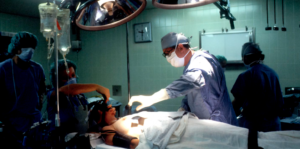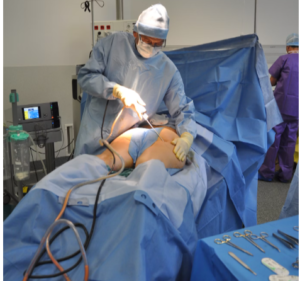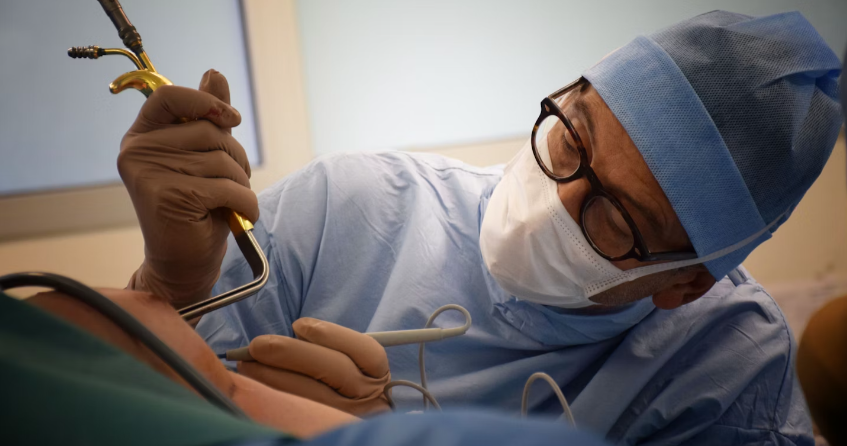Which Weight Loss Surgery Is Safest – A Life-Changing Decision
The world of bariatric surgery is a complicated one. First, you have to decide which weight loss surgery is safest. There are a unique set of procedures that have become instrumental in having a successful surgery. 
Which Weight Loss Surgery is Safest?
Having this option has helped many people struggling with obesity to achieve significant and long-lasting weight loss. Choosing which weight loss surgery is safest is not a walk in the park.
While it’s not a decision to make lightly, understanding your options is the first step towards a potential life-changing journey.
That’s right, we’re talking about procedures like the Gastric Sleeve, Gastric Bypass, Adjustable Gastric Band, and Duodenal Switch. Each of these surgeries has its unique approach to aiding in weight loss.
For instance, some reduce the amount of food your stomach holds, while others limit your ability to absorb nutrients, and some even do a bit of both.
But this isn’t just about losing weight. It’s also about improving or resolving the chronic health conditions that often accompany obesity.
For example a surgery many mitigate illnesses such as:
- Diabetes
- Hypertension
- Sleep Apnea
Managing these conditions with the help of weight loss surgery not only enhances your quality of life but also reduces the risk of long-term complications.
Now, you might be wondering about the safety of these procedures. That’s a perfectly valid concern, and you’ll find out about the various safety profiles next. 
It’s essential to peel back the layers of medical jargon and get a clear perspective on what the recent data and research have to say. So let’s move on and take a closer look at the safety aspects of weight loss surgeries.
Safety Profiles of Weight Loss Surgeries
What the Research Says
When it comes to understanding the safety of weight loss surgeries, I believe turning to the latest research is crucial. Lately, a wave of comprehensive studies has provided a clearer picture of the risks and outcomes associated with bariatric procedures. Let’s find out about what science suggests regarding the safety of the most common surgeries.
You might be wondering how we classify something as ‘safe’ in the context of weight loss surgery.
Some of the short-term complications include:
- Infection or bleeding
- Longer-term risks
- Nutrient deficiencies
- Need for revision surgeries
It’s not just about getting through the operation; it’s also about how your life might change years down the road.
Different surgeries come with different safety considerations. For instance, Gastric Bypass, owing to its complexity, may present a higher risk of surgical complications than the Gastric Sleeve.
On the flip side, each procedure also boasts distinct health benefits that could vastly improve a patient’s quality of life, especially if they are dealing with serious obesity-related health issues.
It’s also essential to note that ‘safest’ doesn’t mean risk-free. Each surgery has potential complications. This is why patient-specific factors play a huge role in determining the most suitable option. 
These factors may include variables such as:
- A person’s overall health
- Medical history
- Obesity-related conditionsand
- Personal preferences and lifestyle
I can’t stress enough the magnitude of this decision. So, the next part of our discussion is even more pertinent. In the following section, we’ll dive into the specifics of the Gastric Sleeve surgery, analyzing its risks, patient suitability, and why it’s becoming one of the more favored choices among both surgeons and patients.
The Gastric Sleeve Approach
Risks and Considerations
I’ll take you through the Gastric Sleeve surgery, also known as sleeve gastrectomy. This procedure involves removing a portion of the stomach to create a smaller, tube-like stomach or ‘sleeve.’
Next, you’ll explore the safety profile of the Gastric Sleeve. This is generally considered to be favorable. It has a lower risk of malnutrition compared to other surgeries since it doesn’t alter the intestines.
However, like any surgical procedure, it comes with risks such as bleeding, infection, and issues related to anesthesia.
Don’t worry too much about the surgery’s risks overshadowing its benefits. Most patients experience significant weight loss and improvements in obesity-related conditions such as diabetes and high blood pressure.
It’s crucial to note that the success of Gastric Sleeve surgery also depends heavily on a patient’s commitment to lifestyle changes.
The best ruke of thumb is to choose a procedure that aligns with your expectations. You may opt for a less invasive and reversible procedure. A Gastric Sleeve might sound more appealing.
That said, it’s not a one-size-fits-all solution. It’s ideal for patients without a complex surgical history, lower BMI, or who may have concerns about the more invasive nature of procedures like the Gastric Bypass. 
A lot is happening very quickly after surgery. Patients require a lifelong commitment to diet and exercise, plus regular follow-ups. Gastric Sleeve empowers many to embark on their weight loss journey, but the road doesn’t end there. Long-term success comes from the changes made in the kitchen and the gym.
Gastric Bypass Surgery
Weighing the Outcomes
Gastric Bypass, often referred to as Roux-en-Y Gastric Bypass, is a well-known weight loss surgery with a history that spans decades. It involves creating a small stomach pouch and rerouting the small intestine to this pouch. As a result, there is a significant calorie and nutrient absorption reduction.
When it comes to safety, Gastric Bypass does have its share of risks. There’s a potential for nutritional deficiencies or the rare chance of a staple line failing.
However, published outcomes show that the risk of severe complications is relatively low, and the surgery may lead to substantial health improvements, particularly in people with type 2 diabetes or severe heart issues.
The surgery is not a one-size-fits-all solution. Ideal candidates for Gastric Bypass typically include those with a BMI over 40, or over 35 with obesity-related health conditions. It’s imperative for anyone considering this surgery to have a comprehensive understanding of the dietary and lifestyle commitments required post-operation.
Moreover, while Gastric Bypass may result in significant weight loss, it is also associated with inducing long-term remission of type 2 diabetes. Another benefit is an improvement in cardiovascular health, and even contributing to longer life expectancy.
These outcomes amplify the safety profile of the surgery by not just focusing on weight loss, but also on enhancing overall health and quality of life.
With any weight loss surgery, including Gaustic Bypass, the success and safety significantly depend on the post-surgical care. Patients should have a reliable support system and follow-up plans. 
This preparation leads seamlessly into the final consideration: the comprehensive care and patient education needed to ensure the safest and most effective results.
Gastric Bypass Surgery Saved My Friend’s Life
As far as I’m concerned, losing any amount of weight is definitely not an easy task. It takes a lion’s share of will power and effort. Although I have never considered to go this route, one of my childhood friends decided to take the plunge.
We both grew up in the same town, were in the same classes from grammar school all through undergraduate school. In some ways we were as thick as thieves. We both loved to eat; especially comfort foods. By the way, we both came from big families and food was always our jam.
The thing is, stuffing our faces without exercise turned out to be a normal pattern for us. As a result, we were always hesitant to jump on the scales in our Physical Education classes. Ironicaly, gym class was one of my favs and I was good at tumbling and doing flips.
However, during undergrad I didn’t see my friend as much. We had both had gotten married and had started a family. So, the day I ran into Joy was a shocker. As I was crossing the campus, I saw with thin figure coming towards me.
When she got within earshot, because of her walk, hairstyle and familiar facial features, I knew right away it was her. She had shrunk to half her size and her face looked kind of hollow. But, I knew who she was.
She explained to me that she had undergone a Gastric Bypass. The surgery removed and stapled a part of her stomach. From her countenance, I knew she had experienced a major life-changing experience.
Joy also revealed that she chose this surgery because her medical conditions had worsened and according to her, the surgery had, literally, saved her life. Then she proceeded to show me some of the loose skin on parts of her body that she was concerned with. However, she was committed to sticking with her new healthier lifestyle.
Seeing my friend half her size, concealing all the loose skin on her thighs and knees, changed my perspectives on the importance of maintaining a healthier lifestyle. However, I am still ambivalent about having this type of surgery.
The good news is that Joy had her skin tightened and looks amazing. From my standpoint, not only did she improve her external physique, she also has a much better relationship with food and has improved her overall health and wellness 100%.
Making an Informed Decision
Consulting with Experts and Considering Long-term Support
Choosing the safest weight loss surgery for you isn’t a decision to make alone. It calls for in-depth discussions with healthcare professionals who specialize in bariatric surgery. These experts will evaluate your health history, weight loss needs, and lifestyle to provide personalized advice. Getting an expert opinion is crucial.
What’s often overlooked is the reality that surgery is just the beginning. Lifelong changes are necessary to maximize the benefits of any weight loss procedure. Having a solid support team in place is crucial. Dieticians, psychologists, and exercise coaches are integral to a successful weight loss journey.
In my practice, I’ve witnessed firsthand the impact of comprehensive aftercare. Follow-up care, including nutrition planning, exercise regimens, and mental health support, plays an undeniable role in ensuring safety and effectiveness of the surgery.
Don’t worry too much about the scale right after surgery. The true measure of success is your ongoing commitment to a healthier lifestyle. You can always adjust your approach down the road. However, the cornerstone is the support you get and the habits you form.
In wrapping up, remember that safety isn’t just about the surgical procedure. It extends to the aftercare, the support network, and your own dedication to change. I really hope that this overview has equipped you with the knowledge to take the next step confidently.
Founder and CEO
(w) mybluegenes.com
(e)rachele@mybluegenes.com






One Comment